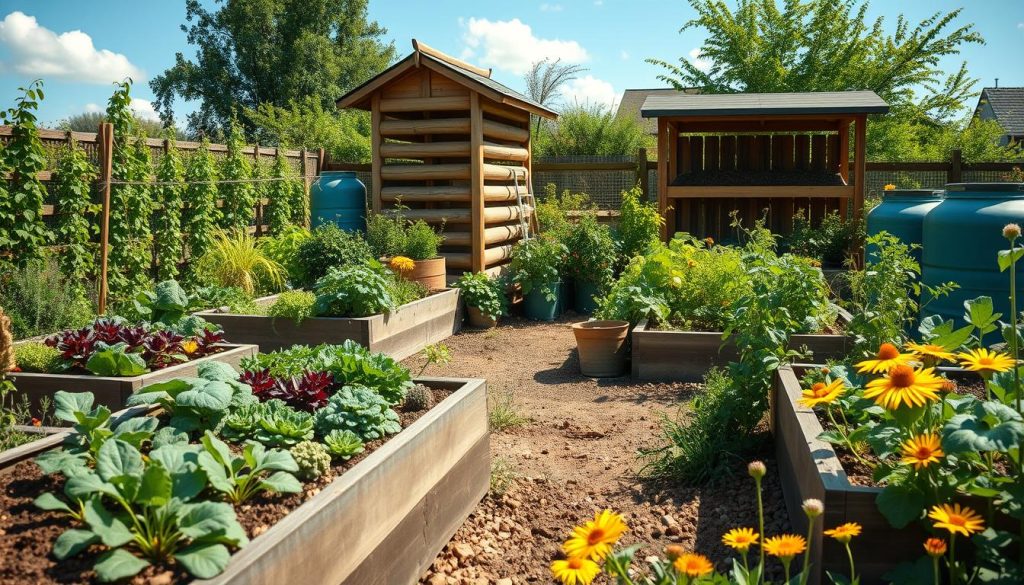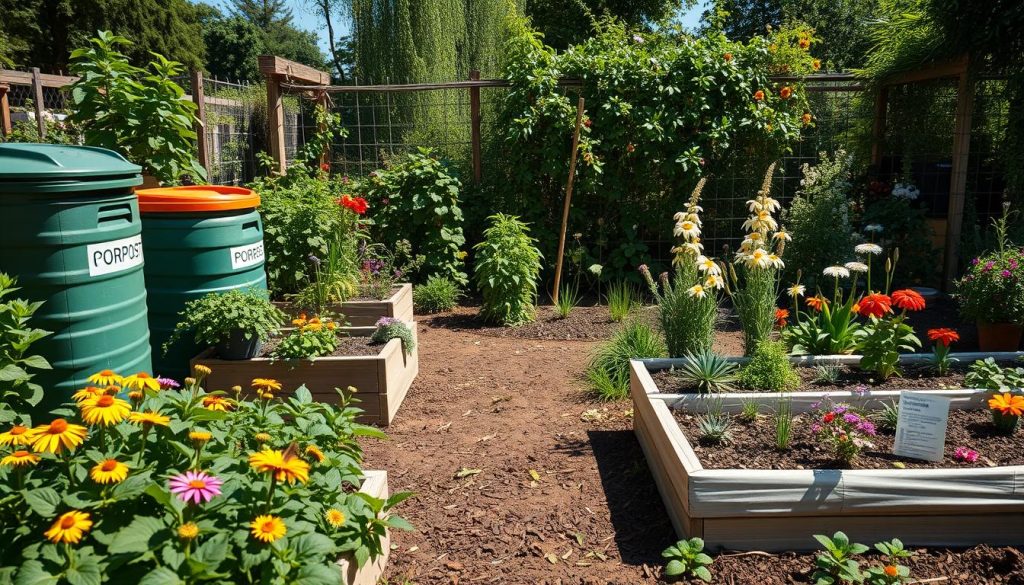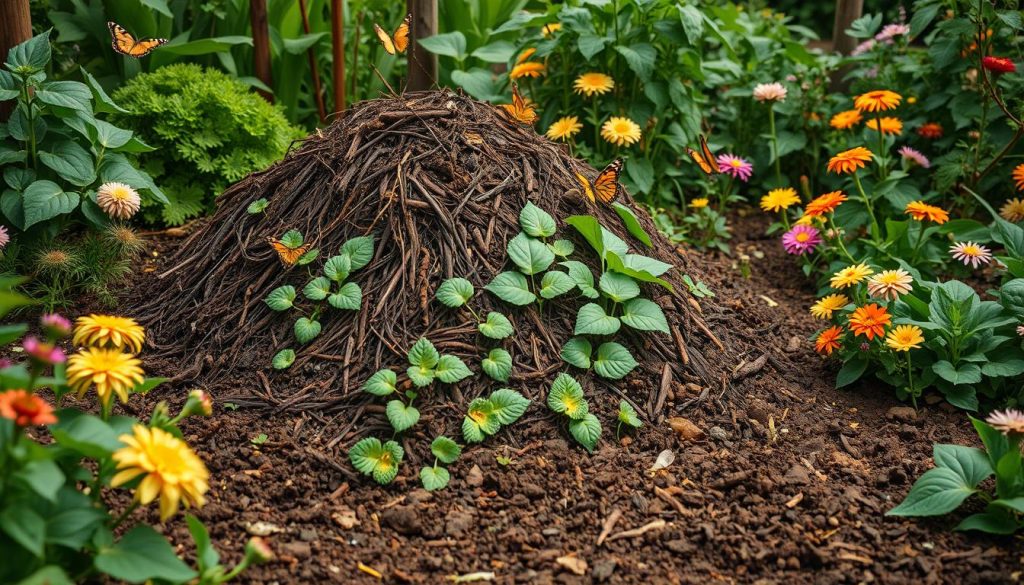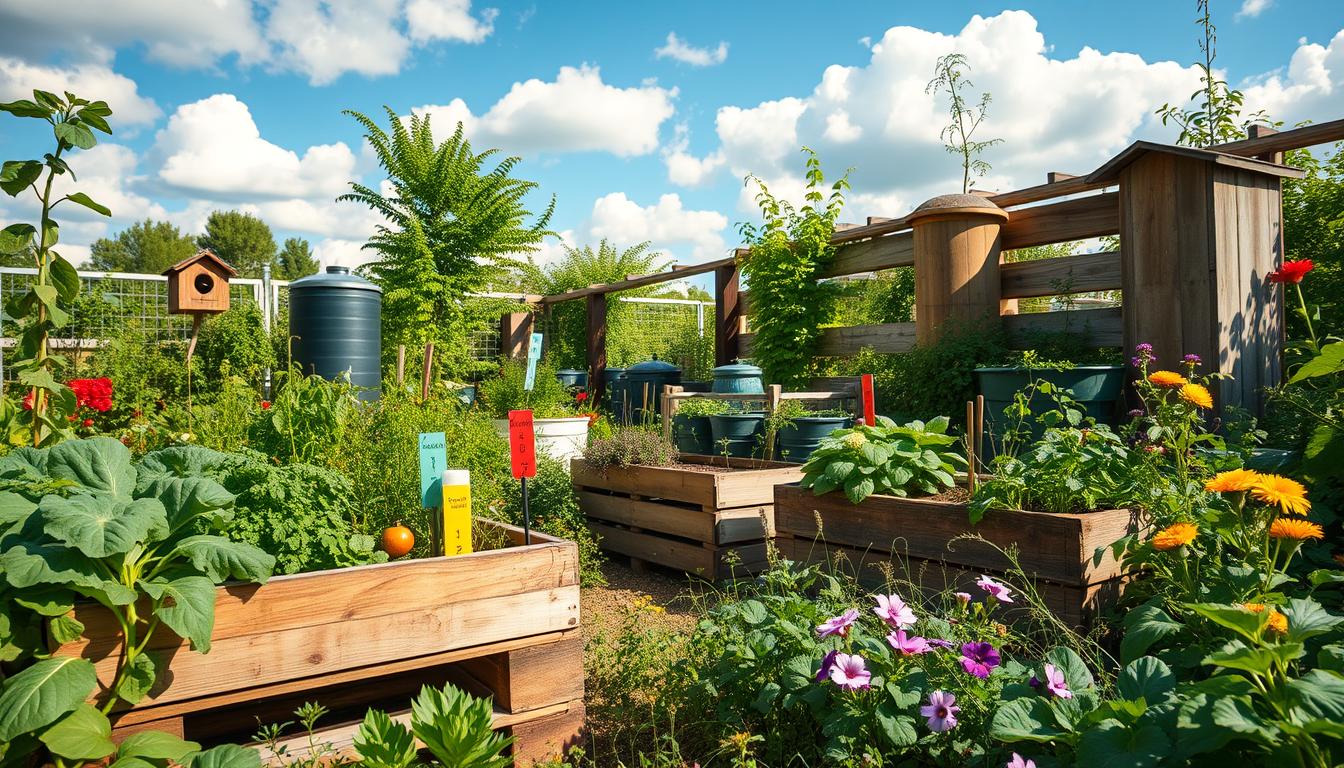I’m excited to share my journey to waste-free gardening. I want to give you tips on reducing waste in your garden. By using eco-friendly gardening ideas, we can make our gardens more sustainable.
It’s important to inspire others to garden without waste. We can do this by sharing our experiences and the benefits. This way, we can encourage others to join us in reducing waste and gardening in an eco-friendly way.
In this article, I aim to give you practical advice and inspiration for waste-free gardening. Together, we can positively impact our environment. We can create beautiful, thriving gardens without waste.
Understanding the Importance of Waste-Free Gardening
Exploring waste-free gardening shows us its big impact on our planet. It helps us use less chemical fertilizers and pesticides. This makes our gardens healthier for plants and animals.
This method also helps our environment and gardens. It cuts down on waste and boosts biodiversity.
Some key benefits of waste-free gardening are:
- It saves natural resources like water and soil.
- It creates homes for local wildlife, helping biodiversity.
- It grows healthier plants and crops with natural fertilizers.
Zero waste gardening inspires us to lessen our environmental impact. It teaches us to think differently about waste. We learn to reuse and recycle in our gardens.
As we dive into waste-free gardening, we find many benefits. It improves soil health and supports local ecosystems.

Adding sustainable gardening to our lives helps the environment and our communities. It’s a great choice for gardeners of all levels. Waste-free gardening is a way to make a difference and inspire others.
Getting Started with Waste-Free Practices
To start our journey to waste-free gardening, we need to look at our current habits. We can reduce waste and make our garden more sustainable. Start by checking how you use water and fertilizers. Look for waste-free gardening techniques.
As we work towards waste-free gardening, setting realistic goals is key. Start with small changes, like composting or using rainwater. These steps can greatly reduce waste in our gardens and help the environment.
Assessing Your Current Gardening Habits
- Evaluate your use of fertilizers and pesticides
- Assess your water usage and explore rainwater harvesting options
- Consider composting food scraps and yard waste

Setting Realistic Goals
Setting achievable goals is crucial for waste-free gardening. Start by picking one or two areas to improve. This could be using less single-use plastics or recycling garden waste.
Essential Tools for Waste-Free Gardening
Having the right tools helps us adopt waste-free gardening. You’ll need a compost bin, a rainwater system, and reusable containers. These tools can greatly reduce waste and support sustainable gardening.
Composting: A Gardener’s Best Friend
Composting is key in eco-friendly gardening. It helps us reduce garden waste naturally. By composting, we turn kitchen scraps and yard waste into nutrient-rich soil.
First, we need to know what can be composted and what can’t. Here are some tips:
- Fruit and vegetable peels, cores, and rinds
- Tea bags and coffee grounds
- Grass clippings and leaves
- Eggshells and bread scraps
But, we should avoid meat, dairy, and oily foods. They attract pests and smell bad. By following these tips, we can make a great compost bin.

Composting makes our gardens more sustainable. It cuts down on synthetic fertilizers and saves water. Let’s keep exploring eco-friendly gardening ideas for a better future.
Creative Uses for Kitchen Scraps
I’ve found many ways to use kitchen scraps in my garden. This helps me reduce waste and make my garden more sustainable. One cool trick is to regrow vegetables from scraps. It cuts down on waste and gives me fresh veggies all the time.
There are many eco-friendly gardening ideas using kitchen scraps. For instance, coffee grounds can make the soil more acidic. Eggshells, when crushed, keep pests away. And, peels and rinds can act as a natural mulch, keeping the soil moist and weed-free.
Regrowing Vegetables from Scraps
- Regrow lettuce and herbs from cuttings
- Use vegetable scraps to create a compost tea
- Grow new plants from seedlings
Making Natural Fertilizers
Using kitchen scraps to make natural fertilizers is a great idea. It helps me avoid synthetic products and makes gardening better for the planet. This approach is good for my garden and the environment.
Inspiring Others through Community Engagement
To promote waste-free gardening, we need to work together. By joining forces, we can make a big difference for our planet. We can share tips on reducing waste in gardens and show others how to do it too.
There are many ways to get involved. We can host workshops, start garden sharing groups, or work with schools. These actions help spread the word about green gardening. They also give people a chance to learn from each other.
Community Initiatives
- Host a waste-free gardening workshop to teach others about sustainable gardening practices
- Create a garden sharing network to connect gardeners and promote knowledge sharing
- Collaborate with local schools to educate children about the importance of waste-free gardening
Together, we can build a greener gardening community. We can share tips on reducing waste and help others start their own waste-free gardens. This way, we encourage more people to garden in a sustainable way.
Using Social Media to Share Your Journey
As I keep going on my zero waste gardening journey, I’ve found social media is key. It helps me connect with others who care about the environment. I share my garden’s progress and tips, hoping to inspire others to reduce waste in their gardens too.
Here are some ways to share your journey:
- Post photos of your garden on Instagram and use hashtags.
- Share tips and tricks on Facebook and Twitter.
- Create a blog to document your journey and share your knowledge.
By sharing our experiences, we build a community of gardeners who care about waste.
Documenting Your Waste-Free Gardening
Documenting your journey is easy. Just take photos of your garden and post them online. You can also keep a journal or blog to track your progress and share it with others.
Engaging with Like-Minded Communities
Connecting with others who share your passion is rewarding. Join online forums or social media groups to share your knowledge and experiences. This way, you can inspire and learn from others.
Overcoming Challenges in Waste-Free Gardening
Starting my waste-free gardening journey wasn’t easy. But, with creativity and determination, I’ve tackled the hurdles. Finding the right mix of compost and garden reuse was a big challenge. It’s all about trial and error to find what works for your garden.
Common Obstacles and Solutions
Staying motivated was tough, especially when life gets busy. Celebrating small victories, like reducing waste or making compost, helped a lot. Also, joining online communities for waste-free gardening kept me inspired and connected with others.
Staying Motivated and Encouraging Others
The joy of waste-free gardening is seeing its positive effects. Sharing my gardening tips with friends and family motivates them to be more eco-friendly. Together, we can make our gardens and planet greener.
Celebrating Small Wins and Progress
Improving my waste-free gardening skills is rewarding. Every compost pile and regrown veggie brings me closer to a sustainable lifestyle. Embracing challenges and celebrating small wins shows that we can all make a difference, garden by garden.

